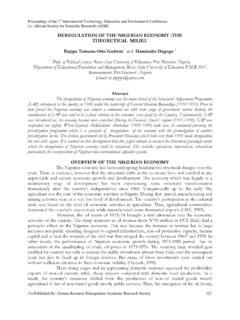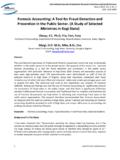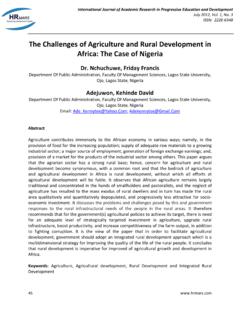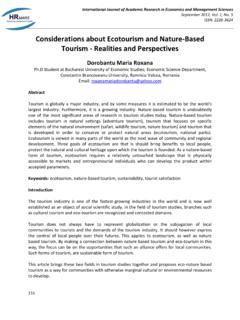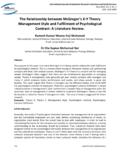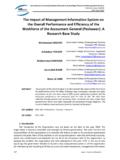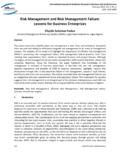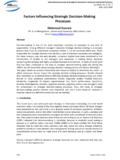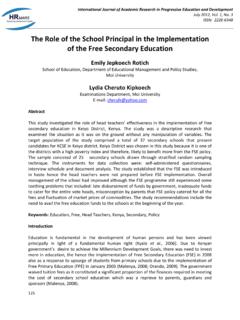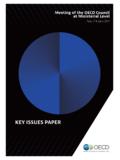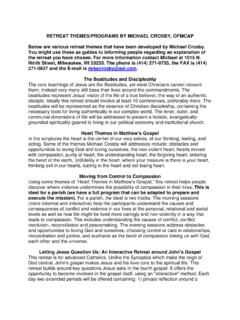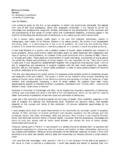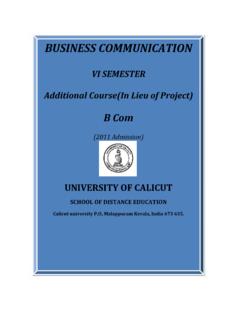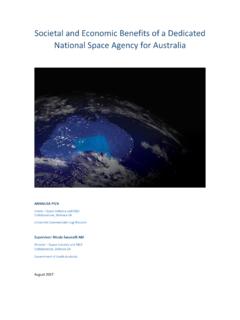Transcription of The SHONA Proverb as an Expression of UNHU/ …
1 International Journal of Academic Research in Progressive Education and Development January 2013, Vol. 2, No. 1 ISSN: 2226-6348 100 The SHONA Proverb as an Expression of UNHU/ UBUNTU Evans Mandova Department Of African Languages And Literature, Great Zimbabwe University, Masvingo, Zimbabwe Email: Agrippa Chingombe (Department Of Educational Foundations) GREAT ZIMBABWE UNIVERSITY, MASVINGO, ZIMBABWE And Simon Nenji (Department Of Educational Foundations), GREAT ZIMBABWE UNIVERSITY, MASVINGO, ZIMBABWE Email: Abstract This paper is a discourse on the SHONA Proverb as a conduit for the transmission and Expression of fundamental attributes of ubuntu. The research argues that traditional Zimbabwean institutions drew sustenance from the country s value systems and experiences embodied in the SHONA Proverb .
2 The SHONA Proverb , as a product of the historical and cultural experiences of the SHONA people, unravels the worldview of the SHONA people. It is the submission of this paper that ethos which constitute ubuntu are embodied in the SHONA Proverb . UNHU/ ubuntu is vital in creating the necessary general framework within which people can pursue their life s existential projects necessary for development. Zimbabwe therefore needs recourse to the wisdom encapsulated in the SHONA Proverb in order for her to experience equipoise, harmony, serenity, balance and peace, which are the basis for Africa s progress. Introduction Unhu is a SHONA word which is ubuntu in Nguni. The concept of unhu in Zimbabwe is similar to that of other African cultures. Unhu is a social philosophy which embodies virtues that celebrate the mutual social responsibility, mutual assistance, trust, sharing, unselfishness, self-reliance, caring and respect for others among other ethical values.
3 It means behavior patterns acceptable to SHONA people. This means ethos and attitudes which influence the way people participate in various departments of their lives. Their ethos refers to their conception of what is right and wrong; beautiful and ugly. The ethos is the parameter used to qualify a SHONA person as munhu and not just a human being. Proceeding from the above apprehension, not all SHONA people are vanhu {human beings}. In SHONA culture, a person has to meet certain obligations regarded as good, according to the SHONA worldview, in order to be referred to as munhu. International Journal of Academic Research in Progressive Education and Development January 2013, Vol. 2, No. 1 ISSN: 2226-6348 101 Unhu is perceived as the school of SHONA life that generates ethos that proceeds to inform, govern and direct SHONA people s institutions namely, social, economic, political and religious.
4 It, therefore, regulates, informs and directs the action and approaches to life and its challenges. Unhu sets a premium on human behavior and relations. This paper contends that unhu is a product of the SHONA cultural experiences and derive from their cultural heritage. proverbs are condensed assertions about the shared experiences of a people in history over a period of time. SHONA proverbs are necessitated by SHONA history and culture. They are composed by members of the SHONA community as a conduit, through which the collective experiences of the SHONA people are transmitted. Referring to the SHONA people, Furusa in Mutswairo1 correctly points out that: Their proverbs are a common medium of expressing their collective wisdom which comments on the happenings that reveal a system of values under which the SHONA culture functions and develops.
5 The research has, therefore, selected proverbs as the indispensable SHONA cultural source from which to derive the major attributes of unhu. MAJOR ATTRIBUTES OF UNHU The traditional SHONA society celebrates co-operation and discourages individualism. Social relationships in Africa are not only found among the people, but they also exist between the people and their natural environment and are also extended to the spiritual forces. Relationships at all these levels are sustained through the maintenance of ethos such as reciprocity, participation, harmony and hospitality. The African social philosophy is, therefore, basically communal. The SHONA people say: Imbwa mbiri hadzitorerwi nyama Meat cannot be taken away from two dogs Gumwe rimwe haritswanyi inda A single thump does not kill a louse Rume rimwe harikombi churu A single male person no matter how big does not surround an anti-hill alone The above proverbs are profoundly reflective of the binding philosophy of the SHONA people.
6 An individual views his position in relation to the aspirations of the community. A fragmented stance subverts the possibility of positive participation and contribution. Every member is connected to his society. This is why Mbiti cited in Kaphagawani says: International Journal of Academic Research in Progressive Education and Development January 2013, Vol. 2, No. 1 ISSN: 2226-6348 102 ---whatever happens to the individual happens to the whole group and whatever happens to the whole group happens to the individual. The individual can only say I am because we are and since we are, therefore I am --- The traditional SHONA society celebrates connectedness and cohesion. The society does not elevate the individual and does not see him as solitary and unbound.
7 Okot P Bitek (1981) contends that a man is incapable of being free because his thoughts and actions are guided by the philosophy of life which is instilled in him from childhood. The traditional SHONA society is against the individuals who seek fulfillment outside the context of the group, without realizing that fulfillment itself is not uncluttered space or an absence of controls. It is a powerful and demanding presence. The SHONA say: Varume ndivamwe kutsva kwendebvu vanodzimurana Men are all the same, when their beards burn, they help each other to extinguish the fire It is the spirit of communal fellowship and solidarity that the SHONA culture celebrates. The SHONA people believe that all members, who constitute their society, should form a common front in confronting challenges that threaten their existence.
8 The individual s separate existence is viewed as subordinate to that of the society. Marimba Ani posits that the idea of thriving on competition and individual achievement belongs to European culture: European culture creates a being who thrives on competition and, therefore, on individual and distinct achievement---because a person s existence as a member of the group does not in itself mean much---the individual strives to be better than to stand apart from others in his craving for recognition. The SHONA people believe that fragmentation of society is detrimental to the realization of societal goals. It produces individuals who act in ways that are not commensurate with the celebrated ethos of the society. The essence is to view one s interests within the framework of societal aspirations.
9 An individual is not analyzed outside his problems because his challenges are also the challenges of his society. Ramose5 posits that: The African view of man denies that persons can be defined by focusing on this or that physical or psychological characteristics of the lone individual. Rather man is defined by reference to the environing community as far as Africans are concerned, the reality of the communal world takes precedence over the reality of individual life histories, whatever these may be. And this primacy is meant to apply not only ontologically, but also in regard to epistemic accessibility. The human individual is, thus, inextricably linked to the all-encompassing universe. However, communalism does not negate individualism. Communalism does not necessarily make the individual a mere victim of inflexible demands of the society neither individual freedom of action nor of personal responsibility.
10 The society recognizes that each individual has his/her separate life outside the community, hence the Gikuyu Proverb says: International Journal of Academic Research in Progressive Education and Development January 2013, Vol. 2, No. 1 ISSN: 2226-6348 103 Ciethananga ikigwa ikuumbuka itiri ndugu Birds look for one another to land together, but fly individually The Proverb shows that communalism is not pursued to the detriment of individuality. Individualism has to be pursued within the matrix of the welfare of the society which resultantly brings honor and pride to the society. Individualism is accepted when it correlates with societal aspirations. Everybody has a role to play in communal obligations but they also have private lives.
